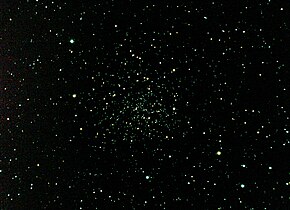NGC 188
Appearance
(Redirected from Polarissima Cluster)
| NGC 188 | |
|---|---|
 NGC 188 | |
| Observation data (J2000 epoch) | |
| Right ascension | 00h 48m 26s[1] |
| Declination | +85° 15.3′[1] |
| Distance | 5,400 ly[2] (1.66 kpc) |
| Apparent magnitude (V) | 10.0[3] |
| Apparent dimensions (V) | 15′ |
| Physical characteristics | |
| Radius | 11.8 ly |
| Estimated age | 6.8 billion years[4] |
| One of the oldest known open clusters | |
| Other designations | Caldwell 1, Cr 6, Mel 2[1] |
| Associations | |
| Constellation | Cepheus |

NGC 188 (also known as Caldwell 1 or the Polarissima Cluster[5]) is an open cluster in the constellation Cepheus. It was discovered by John Herschel in 1825. Unlike most open clusters that drift apart after a few million years because of the gravitational interaction of our Milky Way galaxy, NGC 188 lies far above the plane of the galaxy and is one of the most ancient of open clusters known, at approximately 6.8 billion years old.[4]
NGC 188 is very close to the North Celestial Pole, under five degrees away, and in the constellation of Cepheus at an estimated 5,000 light-years' distance, this puts it slightly above the Milky Way's disc and further from the center of the galaxy than the Sun.
References
[edit]- ^ a b c "NGC 188". SIMBAD. Centre de données astronomiques de Strasbourg. Retrieved 2006-12-08.
- ^ Bonatto, C.; Bica, E.; Santos, J. F. C. Jr. (2005). "Spatial dependence of 2MASS luminosity and mass functions in the old open cluster NGC 188". Astronomy and Astrophysics. 433 (3): 917–929. arXiv:astro-ph/0502453. Bibcode:2005A&A...433..917B. doi:10.1051/0004-6361:20041113.
- ^ Clark, R. N. (1990). Visual Astronomy of the Deep Sky. Cambridge University Press. p. 287. Bibcode:1990vads.book.....C. ISBN 978-0-521-36155-2.
- ^ a b VandenBerg, D. A.; Stetson, P. B. (2004). "On the Old Open Clusters M67 and NGC 188: Convective Core Overshooting, Color-Temperature Relations, Distances, and Ages". Publications of the Astronomical Society of the Pacific. 116 (825): 997–1011. Bibcode:2004PASP..116..997V. doi:10.1086/426340.
- ^ Stoyan, Ronald; Schurig, Stephan (2014). interstellarum Deep Sky Atlas. Erlangen: Cambridge University Press; Oculum-Verlag GmbH. ISBN 978-1-107-50338-0. OCLC 920437579.
External links
[edit] Media related to NGC 188 at Wikimedia Commons
Media related to NGC 188 at Wikimedia Commons- NGC 188 at SEDS NGC objects pages
- NGC 188 at NightSkyInfo.com
- NGC 188 on WikiSky: DSS2, SDSS, GALEX, IRAS, Hydrogen α, X-Ray, Astrophoto, Sky Map, Articles and images
- NGC 188 at the SIMBAD Astronomical Database.
- Ids - Bibliography - Image - B&W Image.
